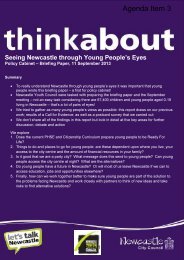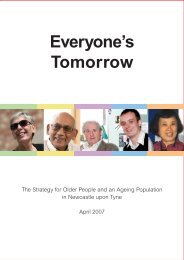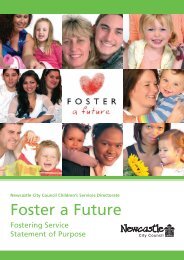Summary Note Policy Cabinet - Newcastle City Council
Summary Note Policy Cabinet - Newcastle City Council
Summary Note Policy Cabinet - Newcastle City Council
- No tags were found...
You also want an ePaper? Increase the reach of your titles
YUMPU automatically turns print PDFs into web optimized ePapers that Google loves.
<strong>Newcastle</strong> <strong>City</strong> <strong>Council</strong>’s 2011-12 <strong>Policy</strong> <strong>Cabinet</strong> meetingfeedbackA policy cabinet meeting focusing on ‘developing jobs and skills opportunities for young people in<strong>Newcastle</strong>’ was held on Wednesday 13 July 2011. This was the first of a series of sessions in ourthinkabout programme. The session gave education and training providers, local employers, thecouncil and its partners the opportunity to discuss the key issues and challenges currently facing thecity and it’s young people.Seven key discussion points were highlighted in a briefing paper. These included:• The impact of the recession and public sector cuts on job opportunities for young people.• The impact of national higher and further education funding changes.• The increasing number of young people remaining in education or training.• The positive increase in educational attainment across the city and the challenge of reducing thenumber of young people who are not in education, employment or training.• Addressing any inequalities in training or job opportunities for young people.• The importance of promoting vocational and academic learning and the development ofopportunities such as apprenticeships.• The need for a more collaborative approach to develop jobs and skills opportunities for youngpeople between <strong>Newcastle</strong> <strong>City</strong> <strong>Council</strong>, education and training providers and employers.The three main issues raised and discussed at this <strong>Policy</strong> <strong>Cabinet</strong> meeting were:1. How can we emphasise the importance of the roles and responsibilities of parents inpromoting learning and raising the aspirations of young people?2. How might funding structures, the National Curriculum and opportunities for learning beused to improve young people’s career pathways?3. How can we promote greater collaboration between all agencies involved in helpingyoung people face the challenges ahead?These areas will be reflected in future policy development of the <strong>Council</strong> and its partners.We are keen to explore more ways of discussing and examining these issues in more detailwith partner in the future as part of a coordinated approach to tackling these issues.
<strong>Summary</strong> <strong>Note</strong><strong>Policy</strong> <strong>Cabinet</strong>: Developing jobs and skillsopportunities for young people in <strong>Newcastle</strong>Wednesday 13 July 2011, Vocational SkillsCentre, Building Futures EastPresent:<strong>Council</strong>lor Forbes (Chair)<strong>Council</strong>lors K Graham, McCarty, Murison and Stephenson (<strong>Cabinet</strong>Members) and <strong>Council</strong>lors Johnson and Lambert (Deputy <strong>Cabinet</strong> Members)and <strong>Council</strong>lor Faulkner (Leader of the Opposition).Caroline Theobald (Bridge Club Limited), Robin Ghurbhurun (<strong>Newcastle</strong>College), Fred Foster (Job Centre Plus), Jill Simpson and Gill Hewitson(<strong>Newcastle</strong> Futures) and Helen Tweddle and Julie Burrell (Building FuturesEast).Barry Rowland, Melanie Bear, John Collings, Steve Evans, Rob Hamilton,Phil Hunter, Michael Johnston, Andrew Lewis, Ray Malecki, Steve Park, IanPoll, Kevin Richards, Deb Tyler, Matt Watson, Nigel Whitefield and ColinWilliams (<strong>Newcastle</strong> <strong>City</strong> <strong>Council</strong>).thinkabout – Developing jobs and skills opportunities for young peoplein <strong>Newcastle</strong><strong>Council</strong>lor Forbes explained that this was the first in a series of sessionswhich would take place at venues across <strong>Newcastle</strong> over the coming year. Itwas hoped that these thinkabout’s would provide an opportunity for the<strong>Council</strong> and its partners to consider how to address the key issues andchallenges currently facing the city.A briefing paper had been circulated on the current position on skills andemployment for <strong>Newcastle</strong>’s young people.
<strong>Council</strong>lor Johnson as Deputy <strong>Cabinet</strong> Member for Skills and Developmenthighlighted the main issues including:-• The impact of the recession on job prospects for young people andpotentially the effect of further public sector cuts in the coming years.• The welcome increase in the number of young people remaining ineducation or taking part in training.• The significant increase in educational attainment which in some caseswas now at or above national best practice, although the number ofyoung people not in employment, education or training, whilst falling, wasstill above national average.• The significant inequalities across the city.• The impact of changes in national funding of higher and furthereducation and the need to ensure young people continue to accessopportunities which prepare them for future employment.• The need to promote further opportunities for vocational as well asacademic learning and enhance opportunities for e.g. apprenticeships.• The need for a more collaborative approach between the <strong>Council</strong>,education and training providers and employers in order to moreeffectively tackle the challenges facing the city.A series of questions had been listed at the end of the paper to help guide thedebate and the CBI and Building Futures East were thanked for thecontributions they had already made in writing.The main issues raised during the discussion are summarised below:-• Academic learning was not necessarily the most appropriate route forevery individual. We need to raise the status of vocational training whichfor too long has been regarded as second best.• How do we tackle the low aspirations which many young people haveand the deeply entrenched culture against learning, particularly amongstyoung males? The impact of peer group pressure and the need for ahome environment conducive to learning were also key factors.• How might the <strong>Council</strong> in partnership with employers and other agenciesreach out to the disengaged as part of a co-ordinated programme ofintervention and prevention services, especially focused on the younger
age range, tackling issues such as school attendance, lack of rolemodels and the importance of vocational as well as academic learningwith such initiatives being carried through to secondary level andbeyond.• How might the ambition to promote the green economy within the subregion be taken forward, given the potential opportunities which mightderive for individuals in terms of acquiring skills, as well as employment.• How might we promote in a more co-ordinated manner the developmentof areas such as aptitude and confidence as well as skills, bridging thegap between what individuals were able to offer and what employerswere seeking? Organisations such as the Education BusinessPartnership had a significant role to play here.• Young people aspire primarily to get a job and earn money but, given theeffects of the recession and contraction of traditional routes toemployment, how might agencies help them to broaden their horizonsand manage their expectations.• Cultural influences inhibiting a desire to learn are deeply entrenched insome parts of the city but this is a national problem rather than beingunique to <strong>Newcastle</strong>. Communications on job opportunities needed tobe enhanced as often agencies did not hear about the many vacanciesin SME’s which were often filled by word of mouth so their contribution totackling the overall problem was not as great as might otherwise havebeen.• Although the introduction of the national curriculum had led to an overemphasison educational attainment over the past 30 years, someschools were taking a very creative approach towards promotion ofvocational training but this was not being addressed consistently.Employment levels were not as stable as in early generations, so youngpeople needed to start building up their skills from a very early stage inanticipation that they might have to change jobs fairly frequently duringtheir career, rather than having a job for life.• Different approaches needed to be taken reflecting different age rangesand circumstances. There was a need for a more collective,collaborative approach in providing information, guidance and support.The <strong>Council</strong>, employers and agencies such as Connexions all had a partin reaching out and trying to engage young people.
• Financial considerations were clearly very significant. The withdrawal ofEMAs could prove to be a significant deterrent and in some cases adistraction as young people may have to look for part time work if theycould not afford to remain in full time education.• It was essential to tackle the deep seated cultural issues such as thesecond and third generation unemployed. More could be done tocelebrate successes through, for example, case studies on howindividuals have progressed having initially taken vocational training, orhow improved numeracy and literacy skills related to the workingenvironment. This would help to tackle the problem of low aspiration.• In general terms, there was still poor contact with the local businesscommunity on a co-ordinated basis. All agencies could play their part inpromoting initiatives such as work experience placements andapprenticeships, as well as actual jobs.• It would be worth exploring the extent to which public sector procurementpolicies could help to maximise job opportunities locally in the city.In drawing the discussion to a close, the Chair felt that three main areas hadbeen highlighted:• Cultural e.g. the role and responsibility of parents in promoting a cultureof learning and higher aspirations.• Structural e.g. the impact of funding regimes, the national curriculumand the opportunities for learning in the broader sense – how mightthese be used to enhance career pathways?• Connections – how might we promote greater collaboration between allthe agencies involved in helping young people to face the challengesahead?These issues will be reflected in future policy development of the <strong>Council</strong> andits partners and the <strong>Council</strong> would be very keen to explore ways of promotingfurther dialogue with partners in the months and years ahead as part of amore co-ordinated approach to tackling the issue.The next Business <strong>Cabinet</strong> meeting on 27 July 2011 will consider theimportant issues highlighted in this note.
















